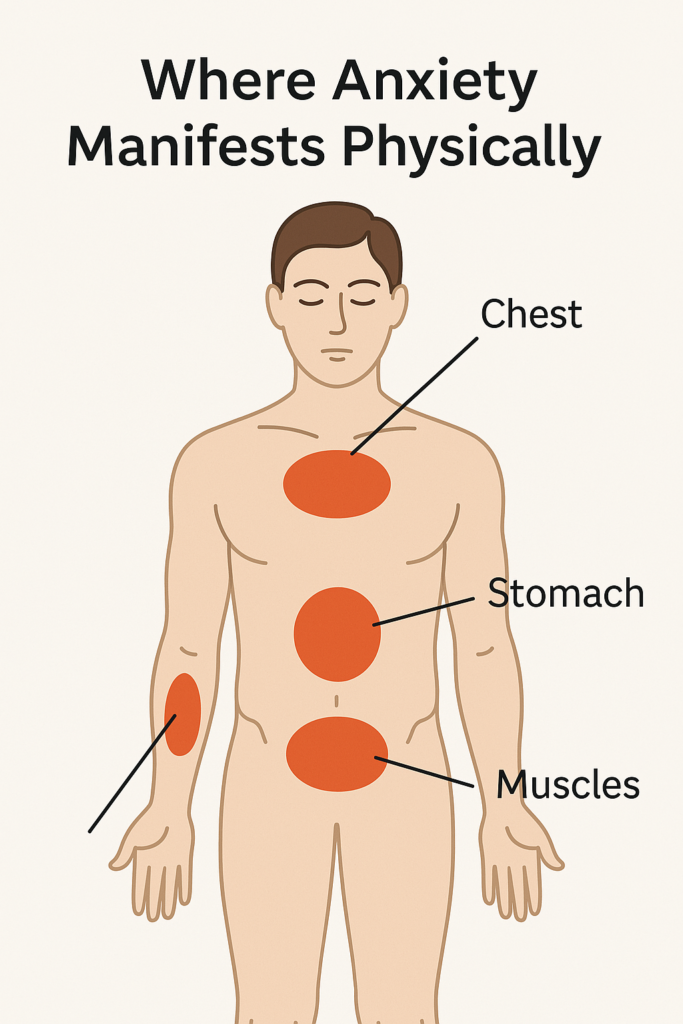How to Reduce Anxiety Naturally at Home
Anxiety is one of the most common mental health challenges of our time, affecting millions of people globally. While professional therapy and medication can be essential for severe cases, many individuals are searching for safe, science-backed ways to ease anxiety from the comfort of their own homes. In this article, we’ll explore how to reduce anxiety naturally at home through holistic practices, lifestyle changes, and evidence-based tools.
Understanding Anxiety and Its Impact
Anxiety is more than just feeling nervous—it’s a physical, emotional, and mental response to perceived threats or stressors. It can affect concentration, disrupt sleep, weaken immunity, and reduce quality of life if not managed effectively.

Common Symptoms of Anxiety
- Racing heart or palpitations
- Restlessness or irritability
- Trouble sleeping
- Shallow breathing or hyperventilation
- Muscle tension
- Difficulty concentrating
Recognizing these symptoms early is essential to taking control of your mental well-being.
Daily Habits That Help Reduce Anxiety Naturally
Start Your Morning with Mindful Intention
Your morning sets the tone for the rest of the day. Avoid checking your phone immediately upon waking. Instead, try:
- Deep breathing for 5 minutes
- Journaling 3 things you’re grateful for
- Drinking a glass of warm lemon water
Incorporate Physical Movement
Physical activity stimulates endorphins and decreases stress hormones like cortisol. Try:
- A 20-minute walk outdoors
- A gentle yoga or stretching session
- Dancing to your favorite music
Prioritize Sleep Hygiene
Sleep deprivation worsens anxiety. Improve your sleep with:
- A consistent bedtime schedule
- Avoiding screens 1 hour before bed
- Using calming teas like chamomile or lavender
Limit Stimulants and Sugar
Caffeine and sugar can spike adrenaline and mimic anxiety symptoms. Opt for herbal teas, whole foods, and stay hydrated.
Breathwork and Relaxation Techniques
Controlling your breath is one of the most powerful tools for calming your nervous system—anytime, anywhere.
Box Breathing
This technique is used by Navy SEALs to manage stress:
- Inhale for 4 seconds
- Hold for 4 seconds
- Exhale for 4 seconds
- Hold again for 4 seconds Repeat for 3–5 minutes.
4-7-8 Breathing
- Inhale through the nose for 4 seconds
- Hold the breath for 7 seconds
- Exhale through the mouth for 8 seconds Promotes deep relaxation and sleep.
Diaphragmatic Breathing
Place one hand on your belly, one on your chest. Breathe slowly and deeply into your belly for 5 minutes. This stimulates the vagus nerve and reduces heart rate.
Nutrition and Natural Remedies for Anxiety
What you eat affects how you feel. Anti-inflammatory and nutrient-rich foods can stabilize mood and ease anxiety.
Best Foods for Calm and Clarity
- Omega-3 rich foods (salmon, chia seeds, walnuts)
- Leafy greens and magnesium-rich foods (spinach, pumpkin seeds)
- Fermented foods (kimchi, yogurt, kefir) for gut-brain health
Herbal Remedies
Always consult a health professional before using herbs, especially if you’re on medication:
- Ashwagandha (adaptogen that lowers cortisol)
- Passionflower (reduces nervous tension)
- Valerian root (supports sleep)
- CBD oil (shown to ease symptoms of anxiety)
Mindfulness and Meditation Practices
Mindfulness is the practice of staying present without judgment. When applied consistently, it reprograms the brain’s stress response.
Body Scan Meditation
Lying down, mentally scan your body from head to toe, releasing tension in each part.
Guided Meditation Apps
Top apps for beginners:
- Headspace
- Insight Timer
- Calm
Walking Meditation
Focus on each step, the contact with the ground, and your breath. Especially helpful if sitting still increases anxiety.
Creating a Safe and Supportive Environment
Your surroundings can affect your mood and mental state. Make your home a sanctuary of calm.
Declutter and Organize
Visual clutter = mental clutter. Take 10 minutes daily to tidy a small space.
Use Soothing Scents and Sounds
- Essential oils: lavender, bergamot, sandalwood
- Background sounds: ocean waves, rain, ambient music
Set Digital Boundaries
Limit social media, unfollow anxiety-triggering accounts, and schedule digital detox time.
Social Support and Self-Compassion
You don’t have to do it all alone. Having someone to talk to or simply listening to yourself with kindness can transform your emotional landscape.
Stay Connected
- Call a friend or loved one
- Join an online support group
- Talk to a mental health professional if needed
Practice Self-Compassion
Replace negative self-talk with kindness:
- “I’m doing my best.”
- “It’s okay to feel anxious sometimes.”
- “This moment will pass.”
FAQ: How to Reduce Anxiety Naturally at Home
Q1: What is the fastest natural way to reduce anxiety?
A: Breathwork—especially box or 4-7-8 breathing—offers immediate relief for anxiety symptoms.
Q2: Can anxiety really be managed without medication?
A: For many people, yes. Lifestyle, mindfulness, nutrition, and breathwork can significantly reduce symptoms. But always consult a professional.
Q3: How long does it take to see results from natural methods?
A: You may notice a difference in minutes (breathwork), days (sleep, nutrition), or weeks (meditation and routines).
Q4: Should I try all of these techniques at once?
A: No. Start small—choose 2 or 3 that resonate most with you and build from there.
Q5: Are these strategies safe for teens or older adults?
A: Yes, most techniques are adaptable for any age. Always tailor practices to personal needs and health status.
Final Thoughts
Learning how to reduce anxiety naturally at home is about creating sustainable, kind habits that nourish your body, mind, and spirit. You don’t need to do everything at once—start with one breath, one mindful moment, and build from there. Over time, your nervous system becomes more resilient, your mind more focused, and your spirit more at peace.
You are not alone—and healing is possible.
🪷 If this article helped you, share it with someone who needs it today.

